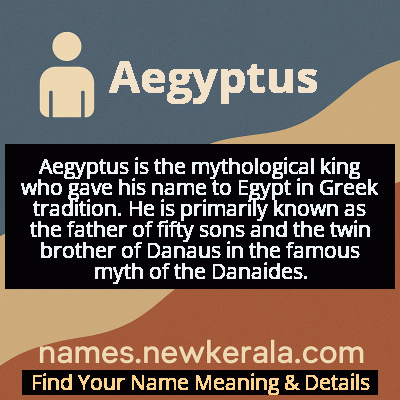Aegyptus Name Meaning & Details
Origin, Popularity, Numerology Analysis & Name Meaning of Aegyptus
Discover the origin, meaning, and cultural significance of the name AEGYPTUS. Delve into its historical roots and explore the lasting impact it has had on communities and traditions.
Name
Aegyptus
Gender
Male
Origin
Greek
Lucky Number
6
Meaning of the Name - Aegyptus
Aegyptus is the mythological king who gave his name to Egypt in Greek tradition. He is primarily known as the father of fifty sons and the twin brother of Danaus in the famous myth of the Danaides.
Aegyptus - Complete Numerology Analysis
Your Numerology Number
Based on Pythagorean Numerology System
Ruling Planet
Venus
Positive Nature
Harmonious, responsible, caring, and artistic.
Negative Traits
Overly idealistic, superficial, possessive, or jealous.
Lucky Colours
Pink, turquoise.
Lucky Days
Friday.
Lucky Stones
Diamond, turquoise.
Harmony Numbers
2, 3, 9.
Best Suited Professions
Artists, musicians, teachers, healthcare workers.
What People Like About You
Warmth, nurturing nature, artistic flair.
Famous People Named Aegyptus
Aegyptus (Mythological)
Mythological King
Ruler who gave his name to Egypt, father of fifty sons who married the Danaides
Aegyptus Belus
Mythological Figure
Son of Belus and twin brother of Danaus in mythological genealogy
Aegyptus (Literary)
Literary Character
Central figure in the myth of the Danaides featured in Aeschylus' lost play 'The Danaids'
Name Variations & International Equivalents
Click on blue names to explore their detailed meanings. Gray names with will be available soon.
Cultural & Historical Significance
Extended Personality Analysis
Based on mythological accounts, Aegyptus is characterized as a determined and ambitious ruler who sought to consolidate power through strategic family alliances. His insistence on marrying his fifty sons to their fifty cousins, despite his brother Danaus' objections, reveals a personality marked by persistence and perhaps authoritarian tendencies. The mythological narrative suggests he possessed strong leadership qualities and a commitment to expanding his dynasty's influence, though these traits ultimately led to tragic consequences. In Greek moral tradition, his character serves as a cautionary example about the dangers of excessive ambition and the complex dynamics of power within royal families, embodying the classical tension between individual ambition and familial responsibility that so often defines tragic figures in Greek mythology.
Modern Usage & Popularity
In contemporary contexts, Aegyptus is virtually nonexistent as a personal name and functions primarily as a historical and mythological reference. The name appears mainly in academic works, classical studies, and specialized publications dealing with Greek mythology or ancient Mediterranean history. Its usage in modern times is limited to scholarly discussions, literary references, or occasional appearances in historical fiction where classical themes are explored. There are no discernible popularity trends for this name in modern naming practices, as it remains firmly rooted in its mythological origins rather than being adopted for contemporary children, making it one of the many classical names that have not transitioned into modern usage despite their rich historical significance.
Symbolic & Spiritual Meanings
Symbolically, Aegyptus represents the mythological bridge between Greek and Egyptian civilizations, embodying the ancient Greek understanding of their relationship with Egypt. The name carries connotations of royal authority, dynastic ambition, and the tragic consequences that can arise from familial conflicts over power and succession. Metaphorically, it speaks to the themes of cultural exchange, the weight of inheritance, and the complex interplay between brother nations. The story of Aegyptus and his sons serves as an enduring symbol of how ambition and familial discord can lead to catastrophic outcomes, while also representing the Greek mythological tradition of explaining foreign lands and cultures through familiar familial narratives and divine interventions.

